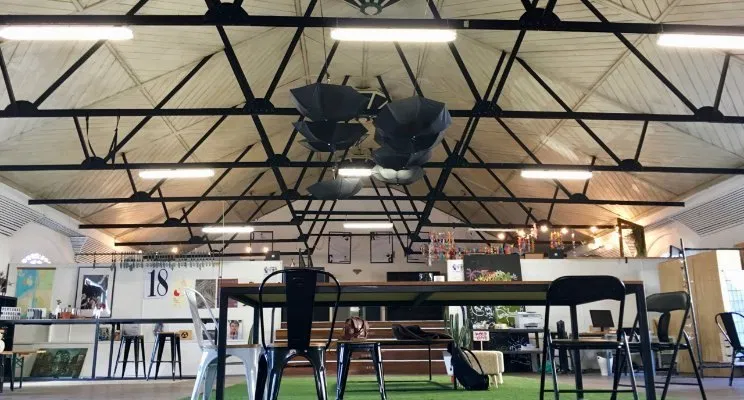Why we need to share space

For as long as there has been people, there has been a requirement for space. From our need to gather to our need to exercise, from art expression and sharing, through to learning. Or to simply be…. Space is pretty much essential to us humans.
It seemed to be that in our past, spaces were shared pretty effectively. Any visit to an ancient city ruin shows this well. But that was easy when we had populations of tens of thousands. Now we have populations of millions, with tall buildings and frantic freeways where voices cannot be heard. Now, instead of the village, we talk of society… even though we often hear of that yearning to ‘bring the village back’. How do we create a village in the cities amongst the millions of us? Why do we build more and more, when it’s more than possible we might have more than enough space…. We just are terrible at sharing it… or knowing where it is.
I've worked in education all my life. In fact, I've been institutionalised since I was 5…. Primary school, Secondary school, University, 13 years of teaching and 10 years of educational consultancy… In that time you see patterns of behaviours and similarities of culture. Schools are like villages and they use their space well because they're manageable in size and it's shared… really effectively. Outside of the school boundary where suburbia lives - we have silo’d our lives too much. Fences, garage doors, stranger danger and car culture have closed us off from each other. And the internet doesn't exactly help. We know it, acknowledge it… and accept it.
But it’s not all bad…There is change in the air and tech has been enabling the solution. According to Canstar, 68% of Australians now spend and earn money through the sharing economy. You’re thinking this translates to Airbnb and Uber, and it likely does, but it’s extending now to other things like Airtasker and Carnextdoor. Aside from convenience and value for money, all these sharing economy models have one thing in common - they connect people.
Imagine then if there was a sharing economy for spaces? We could connect spaces to people and people to spaces. What would that mean in our cities of millions? If everyone shared spaces, could it mean less commuting on the freeways? Could it mean that normally deserted buildings, rooms, studios….etc are used more often? Could it challenge and disrupt certain industries? Could it turn the idea of a city centre on its head? Could it mean less landlords and more money for local area economies? Most importantly, could it allow more people to connect and experience more village again?
Our suburbs are mostly silent during business hours… and outside of these hours where the tall buildings rise… also quiet… doesn't it seem like we could do this better? The great thing about living in this age is our work can happen anywhere… armed with a laptop and reasonable internet access, it’s never been easier to conduct our business. People don't need the CBD like they once did. The thing is, some days all you need a quiet room, other days you need a meeting space and from time-to-time, a training venue. Few workplaces offer all of these things and neither does the local cafe… unless it offers decent work spaces. By sharing more, we get to live in ways that past generations could have only imagined. Sharing space really is the way forward for all of us.

Jeremy Hurst, Co-Founder of SpacetoCo
Related
Hillview Intercultural Community Centre - nominated for the National Local Government Awards 2022
Aug 25, 2022 3:05:26 PM in "Community Centres"SpacetoCo is Approved to Supply to Tasmanian Councils
Feb 2, 2022 11:38:41 AM in "local government"City of Vincent & SpacetoCo - A partnership in community
Mar 9, 2018 11:05:55 AM in "Host Stories"Recent Articles
Categories
- News (93)
- Partner Host (58)
- Host (53)
- Guest (31)
- What's New? (29)
- Community Centres (26)
- local government (23)
- Verified Guest (20)
- Media (15)
- Space Sharing (15)
- Increase bookings (14)
- Founder Stories (13)
- venue hire software (12)
- Economic Development (11)
- efficiency (10)
- Host Stories (9)
- Council (8)
- Sharing Economy (8)
- councils (8)
- efficiencies (8)
- venue hire (8)
- Case Study (7)
- localgovernment (7)
- Creative Spaces (6)
- New Zealand (6)
- Small Business (6)
- Funding (5)
- Sustainability (5)
- collaboration (4)
- spacetoco (4)
- Western Australia (3)
- awards (3)
- partnership (3)
- Wellness spaces (2)
- cx (2)
- innovation (2)
- programming (2)
- LGAT (1)
- Preferred Supplier (1)
- Security (1)
- Tasmania (1)
- account (1)
- activation (1)
- activexchange (1)
- booking (1)
- customers (1)
- data (1)
- events (1)
- finish (1)
- guests (1)
- megatix (1)
- notifications (1)
- performance spaces (1)
- public sector network (1)
- recreation (1)
- set up (1)
- sharing (1)
- sofarsounds (1)
- support (1)
- ticketing (1)
- user journey (1)
